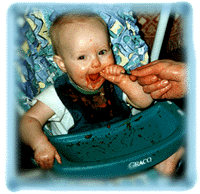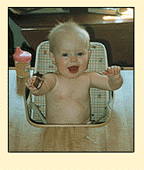|
Starting Solid Foods My Thoughts on Starting Solids t first, "starting solids" seems like it might be fun. (At Ellen's
6 month check up, the doctor even said they were just "for fun" at this age!)
But in my experience, it can be a pain. It's messy. And when t first, "starting solids" seems like it might be fun. (At Ellen's
6 month check up, the doctor even said they were just "for fun" at this age!)
But in my experience, it can be a pain. It's messy. And when
 your baby clamps her mouth shut and turns her head, you say with frustration, "Oh, come on, just trrrrry it!!" (Which is a bad idea, by the way--never force your baby to eat; it can cause food
problems later on.) What seemed like fun can end up
making parents anxious. So, after my experience with my first child, with my second child I decided to wait until I felt the time was right before offering him solid foods. your baby clamps her mouth shut and turns her head, you say with frustration, "Oh, come on, just trrrrry it!!" (Which is a bad idea, by the way--never force your baby to eat; it can cause food
problems later on.) What seemed like fun can end up
making parents anxious. So, after my experience with my first child, with my second child I decided to wait until I felt the time was right before offering him solid foods.
Authorities agree that babies shouldn't have solids until at least four months, but four months is not the "magic" age of readiness for solid foods. Many experts feel that solid foods should not be introduced until six months, and the American Academy of Pediatrics' policy on Breastfeeding and the Use of Human Milk assures us that "exclusive breastfeeding is ideal nutrition and sufficient to support optimal growth and development for approximately the first 6 months after birth " (point number six) and that in "the first 6 months, water, juice, and other foods are generally unnecessary for breastfed infants" (point number seven). Others believe that this is a conservative estimate and that exclusive breastfeeding is sufficient to "support optimal growth and development" well beyond six months. Starting solid food too early or offering too much solid food can diminish a nursing mother's milk supply and put her baby on the path to early weaning. Another reason early introduction of solid foods might cause a baby to wean early is if he looks at breastfeeding as mainly a source of food, and is not attached to it for comfort reasons, when starting solid foods, he might start losing interest in breastfeeding. To him it would just be one food replacing another. Ellen became interested in solid food at around 7 months. Because her weight gain slowed way down after six months, at eight months we began feeding her a lot of solid foods--three meals a day on the advice of our doctor. My milk supply went down, and Ellen began loosing interest in nursing. I became afraid she was on her way to weaning. Instead of giving up, I made the decision to place more emphasis on nursing. I let her nurse whenever she wanted. I did not worry about "spoiling" her appetite for solid food. I knew that breastmilk was better than cereal or banana! I quit trying to "stuff" her on solid foods. I also stopped offering her very much juice or water, and I chose to let nursing quench most of her thirst. And it worked! My milk supply built up, and she grew more interested in nursing again, and I still nurse her and her baby brother, too (and yes, Ellen eats lots and lots of solid foods). (At eighteen months, when I first wrote these thoughts about solid foods, some days she was more interested in solid food than others; and she enjoyed drinking a little juice or water from a cup.)
I offered my second child his first solid food when he was seven months old. Up until then he had been happy sitting at the table with us and chewing on a spoon, cup, toy, etc. But one morning he was fussing during our meal, and I wanted to have a good chance to eat my breakfast, so I thought, "Hmmmmm. Maybe he'd like some Cheerios." So I put some on the table in front of him, and he enjoyed feeling them and trying to pick them up. That day he didn't really understand how it all worked--it seemed like he tried to nurse the Cheerio that he held between his fingers--and most of them went on the floor, but when one got in him mouth, he seemed so happy about it! And then out it came. But that was okay. He was learning, and from then he has gotten better and better at picking up and gumming and swallowing the Cheerios. Now--a week after he first started solids--he has knawed on a chicken leg bone (with the meat taken off) and also eaten some banana and pear. I let him finger feed himself. For the banana, at first I cut it in tiny pieces and put it on the table in front of him; today I just gave him a hunk of banana and let him squash it himself--it was a soft banana). For the pear (it was a pear from a can of chunky fruit in fruit juice) I cut it in tiny pieces and then squashed them with a fork. Tomorrow I think I'll offer him a rice cake! He enjoys his food so much, and I have fun watching him eat it. I wonder how long his fascination with it will last. I am going to try and make sure that breastmilk is still his main source of food; I don't want to make the same mistakes I made with Ellen. He drinks a few sips of water sometimes, but not everyday. I am going to avoid juice for as long as I can. There is no special age by which solids need to be introduced. Every baby is different, and it is important to follow your baby's cues. Signs of possible readiness are the ability to sit unsupported, loss of the tongue thrust reflex, a genuine interest in watching you eat, and attempts to feed himself. If your child shows all or some of these signs, they do not mean that your child must start solids now. There is no need to rush, but be sure you give him the opportunity to sit at the table while you eat and enjoy your family's interactions. Even though I chose to wait to introduce solids to my son until seven months, he has been at the table with us since he was a newborn. Early on I nursed him while we ate. Then he wanted to sit in our laps and watch us eat (at about five months he began intently watching us eat). Finally, at about six months, I let him sit in his own seat (he started getting really squirmy and kept trying to grab the food off our plates) and gave him a spoon to chew. He loved it! That kept him satisfied for about a month, and when he was seven months and a week old, he had his first solid food! It's interesting to note that sometimes a baby who is allergic to certain foods will avoid those foods, and if your family has a history of allergies, it might be wise to delay introducing solid foods past 6 months. Breastmilk is the perfect food for babies, so don't worry if your baby clamps his mouth shut and turns his head away (btw, your baby may enjoy food more when he can feed himself). Breastmilk should be the main source of nutrition the first year of his life, so offer the breast first. Generally, as long as a baby is happy, healthy, outgrowing his clothes, has lots of wet and poopy diapers, and his mom lets him nurse as much as he wants, things should be fine! Don't be in a hurry to rush things!
Links A Relaxed Approach to Starting Solid Foods
Our son's experience with starting solid foods. A Relaxed Approach to Starting Solid Foods
Our son's experience with starting solid foods.
 Nursing Helps Keep My Child Healthy by Kim. Nursing Helps Keep My Child Healthy by Kim.
|
 Solids
Solids As I mentioned above, Ellen did not enjoy solids (except for teething biscuits!) until around 7 months old. (It seemed that she was able to swallow her food better around then, and that helped!) I know one little girl who hardly ate any solids at 8 months, and another one who didn't eat much solid food until 12 months. Other children wait even longer before they start solid foods. According to Dr. Sears, your baby may not interested in solids until he is 9-12 months old, and that's normal.
As I mentioned above, Ellen did not enjoy solids (except for teething biscuits!) until around 7 months old. (It seemed that she was able to swallow her food better around then, and that helped!) I know one little girl who hardly ate any solids at 8 months, and another one who didn't eat much solid food until 12 months. Other children wait even longer before they start solid foods. According to Dr. Sears, your baby may not interested in solids until he is 9-12 months old, and that's normal.
 When to Feed
When to Feed